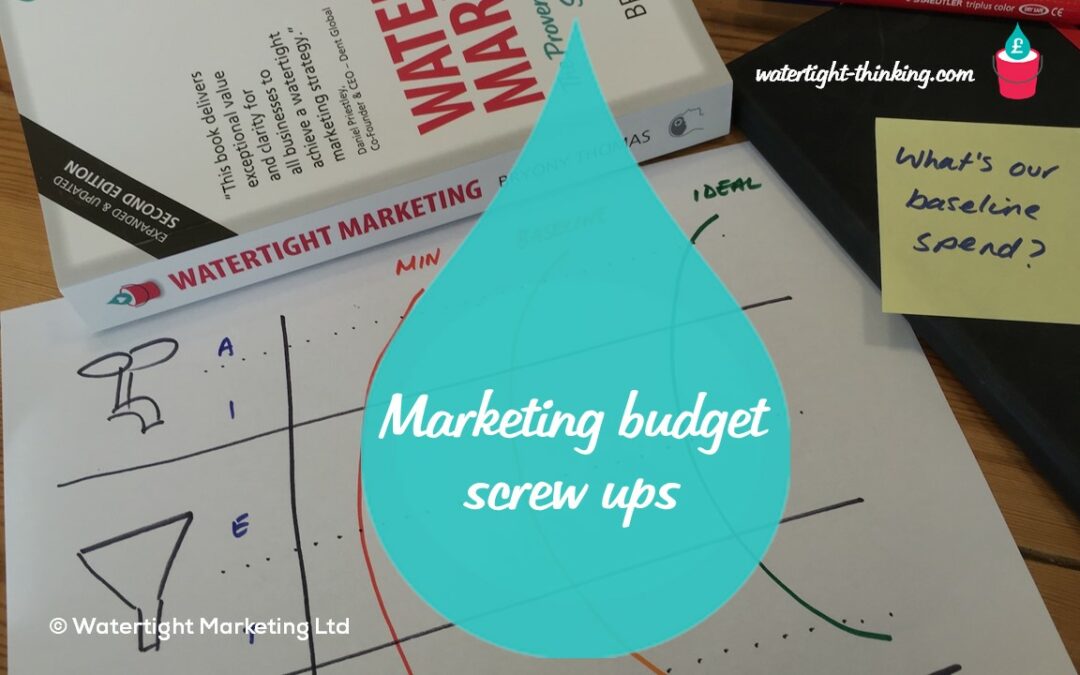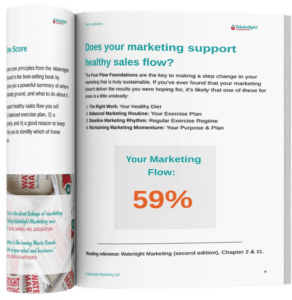Reading Time: 7 Minutes
Setting and getting buy in for your marketing budget can be challenging. It’s not uncommon to find MDs and FDs scratching their heads about what’s planned, or what was spent on, marketing. We also see vying for budget amongst sales teams, account managers and marketers – with each claiming they can put it to best use.
In any marketing leadership role you’re going to need to talk confidently about money. So, here are 10 classic mistakes we see time and time again. Knowing about them is the first step to avoiding them!
1) Basing the budget on last year’s revenue figures
Looking backwards to go forwards may hold you back. There are always lessons to learn from reflection on previous spending and returns. But, making next year’s budget a proportion of last year’s revenue is not smart. Particularly if this year’s target is higher. If you see the revenue number as a destination you need to reach, you’ll need to fuel appropriately – and that means as a proportion of the future goal, not last year’s actuals.
2) Confusing long term investments and this year’s revenue generation pot
If you deduct longer term investments, like a rebrand or similar, from the money you have to generate return that year, you’re in trouble. Many things that a marketing person spends time and money on may not be revenue generating within that year. A rebrand isn’t something you do annually, and so it shouldn’t be financially attributed to the year in which it is done. Separating, and attributing, spend over the time horizon in which it is likely to have an impact is a much more strategic way of doing things.
3) Not having a journey brain
This is about fully defining marketing. So often, marketing is seen as being only responsible for the top of the funnel, i.e. awareness and lead generation. However, your bottom line will thank you for having a full journey approach, ensuring marketing supported steps through the whole journey to profit. Marketing needs to look at tools that support this whole process if the spending on lead generation is to have its best chance of actually generating a return.
4) Counting entertainment as marketing
I once ran a budget where there was a code called ‘marketing miscellaneous’ that I had to fight to get removed. One of the things that most often got listed under that code was entertainment. Once, a trip to Spearmint Rhino! I definitely didn’t approve that. Now, entertainment can be valid marketing. Private dining and roundtable events are great. But the sales team taking one client out to get drunk and calling it marketing really isn’t. Get crystal clear with everyone what is an allowable entertainment expense to be considered marketing. An adhoc night out isn’t strategic!
5) Forgetting ongoing and recurring costs
Damn those domain name renewals! I don’t know about you, but I’ve rarely encountered a business that doesn’t own tens of domain names that come around for renewal each year. There are loads of costs like this that need to be allowed for. Software subscriptions, image licensing, print supplies, etc. This is where looking back is a good idea – look through last year and make sure there’s nothing going to bite you.
6) Presenting your budget as a spreadsheet
If you present your budget as a spreadsheet, people will pick at the numbers. If you present it as a chart, they’ll look at the strategy. If you show a numbers person numbers, they’re going to look at the numbers. Our approach is to visualise the in-year revenue generating marketing budget against the steps in a journey. When you do this, they literally see the strategic rationale and it radically alters the quality of the conversation.
7) Having nothing set-aside for an unforeseen crisis or opportunity
Unexpected things are utterly predictable. We may not know what’s going to crop up, but that something almost always does can be foreseen. Putting aside a contingency, of say 10%, will allow you to respond to a reputitional crisis or jump on a moment of heightened interest.
8) Not having any preplanned flexibility
A marketing budget needs to be responsive. Not reactive, responsive. We get clients to do ABC planning. For each step in the buyer journey they have a Gold (A), Silver (B), and Bronze (C) activity mapped. This means they can flex up or down without springing a leak in their pipeline.
9) Not having set review points with key metrics
Budgeting is not an exercise that should be undertaken once a year. We know that many people have windows in each year when the initial budget is set. But, the smart business leader sees budgeting as a living task. You’ll need to track actuals over time, any variance from plan, and see if the spend in getting you the flow metrics you had anticipated. A minimum interval at which to do this has to be quarterly.
10) Hobbies hiding as marketing!
This is especially true in founder run businesses. We once had a client besotted with racing cars, who put sponsoring his favourite team through the books as marketing. I had a client director who once put a box at Chelsea Football Club through as marketing. Now, firstly, I do know that you can make some value from these by using them for client and prospect events – but that doesn’t mean it’s the best way the money could have been spent. I also readily agree that founders have a right, with Board backing, to have a little fun. This just needs to be recognised for what it is, and not counted as the expenditure that the marketing director is judged by. You should be judged by the decisions you make, not the ones you’re forced to make the best of.
Marketing budgeting is the focus of Chapter 9 of the Watertight Marketing book. Talking money, and being smart about where and when you spend it, is a key skill for any board level marketer.

Bryony Thomas
Author & Founder, Watertight Marketing
Bryony Thomas is the creator of the multi-award winning Watertight Marketing methodology, captured in her best-selling book of the same name. She is one of the UK's foremost marketing thinkers, featured by the likes of Forbes, The Guardian, Business Insider and many more, and in-demand speaker for business conferences, in-house sales days and high-level Board strategy days.


